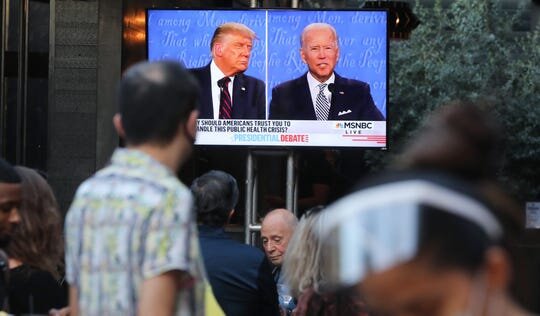Large-scale protests after US election possible: Hunter

TEHRAN – Stating that the likelihood of large scale protests after US election is more than any of previous years, Shireen Hunter said that it reflects the deepening of many divisions, economic, culture, and racial in the US.
As the 2020 US election campaign draws to a close, voters are both more enthusiastic than in previous years and more worried about the outcome of the election and whether their candidate will not win.
Recent polls suggest Joe Biden is likely to win, but Trump's behavior and rhetoric show that he will not simply intend to step down if he fails. The issue of the possibility of a civil war in the United States if Trump loses the presidential election has become more serious than before.
On the other hand, the 2020 US Presidential Election has also challenged Donald Trump and Joe Biden in the field of foreign policy issues, including the US policy towards West Asia (Middle East).
To know more about the US Presidential Election and the effects of its result on US policies, we reached out to Shireen Tahmaasb Hunter Professor of Political Science at Georgetown University in the US.

People sit to watch broadcast of the first debate between Donald Trump and Joe Biden
Here is the full text of the interview:
How do you see the role of electoral votes in determining Biden or Trump's fate in election?
In general, in US presidential elections it is the electoral votes that determine the result. The candidate that wins the majority of electoral college votes is the winner. To win, a candidate needs to obtain 270 electoral votes. Without that, even if a candidate is ahead in popular vote, he /she would lose. So even if Biden obtains more popular votes but Trump gets 270 electoral votes, he would be the winner.
There are reports about possible unrest in the US after the election. What do you think of this? If there are unrests, how will the US political and security structure respond and react to it?
This year, the likelihood of large scale protests and possibly some violence is more than any of previous years. This reflects the deepening of many divisions, economic, cultural, and racial in the US. Therefore, most likely should their candidate lose, both Democrats and Republican supporters of Trump would contest the result. The Federal and state governments are preparing for such contingencies. The National Guard is preparing for all eventualities.
Will the result of the US election affect its foreign policy particularly towards the Middle East and Iran?
In many areas, the US foreign policy under a Biden Presidency would not change much. For example, Biden would continue a rough approach towards Russia and China. But he will strengthen US ties with its European and Asian allies. Regarding the Middle East, Biden, too, will continue American support for Israel regime and will encourage reconciliation between Israel regime and Arab states. However, a Biden administration might do a bit more to encourage an acceptable peace between Israel regime and the Palestinians. US policy in the Persian Gulf is also unlikely to change much, although Biden would not give unconditional support to Bin Salman's regional adventures.
Regarding Iran, too, America's basic positions would not change. A significant improvement in US-Iran relations would require a change in some aspects of Iran's foreign policy. Nor there would be a quick end to sanctions. Biden would want a tougher agreement on the nuclear issue and also concessions from Iran on its missile program and regional activities. However, Biden administration's tone is likely to be more diplomatic. This change in tone could make it easier for Iran to talk to the Biden administration.
Leave a Comment